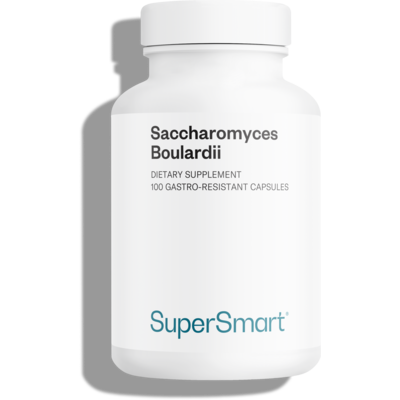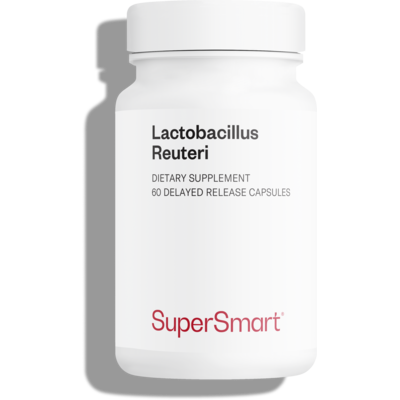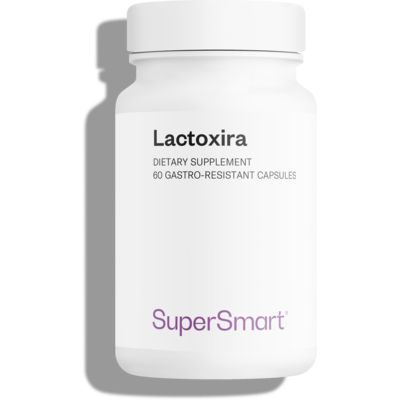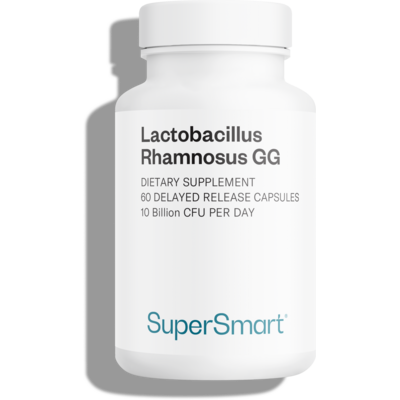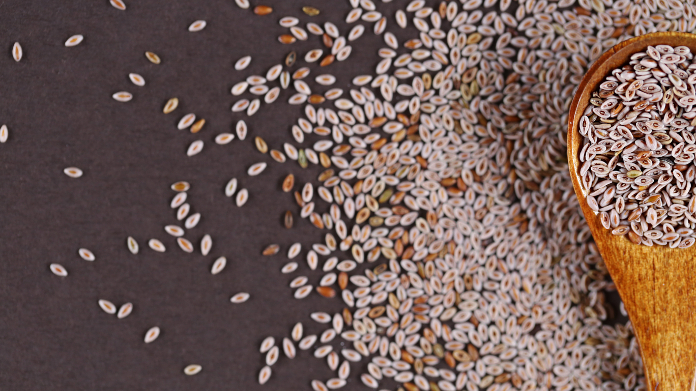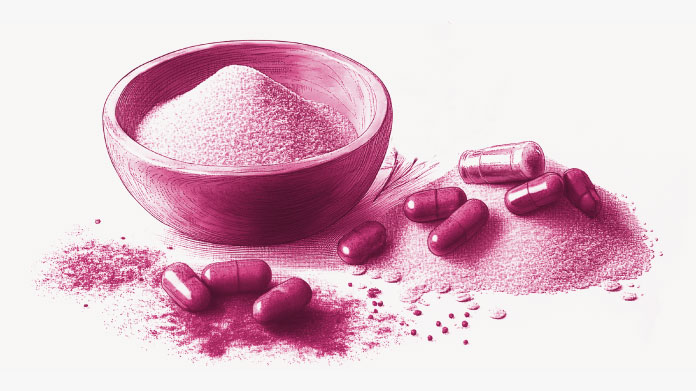How long does it take to restore your gut flora?
Stress, antibiotics, junk food... Our microbiota can be destabilized by a multitude of factors. But how quickly can we expect to restore balance to our gut flora?
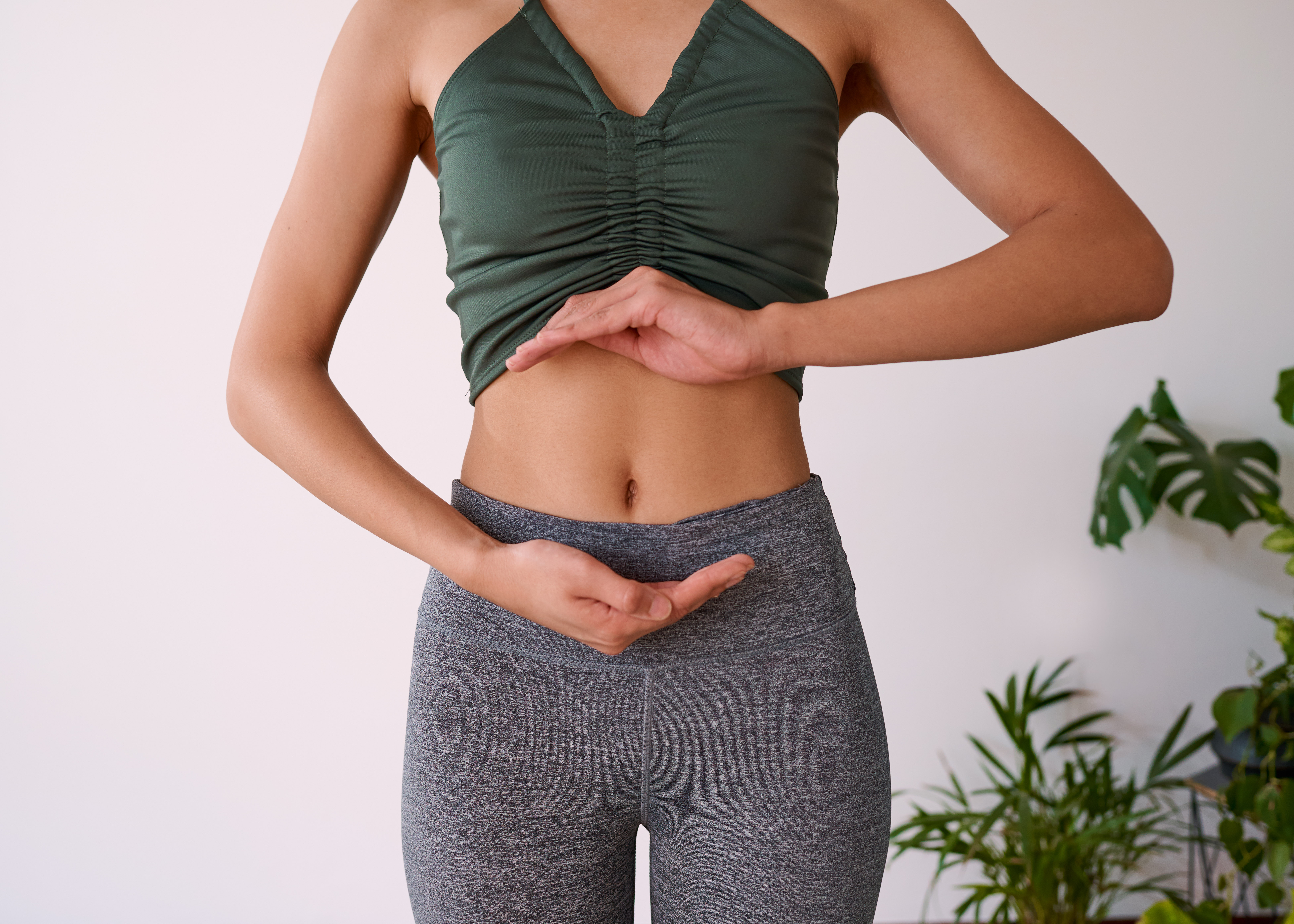
How can you tell if your gut flora is in good shape?
As you know, the intestinal flora (or gut microbiota) is an ecosystem of living microorganisms – bacteria, yeasts, as well as viruses and fungi – which sits in the walls of the small intestine and colon. This is by far the most populated area of the body, playing host to between 1012 and 1014 guests on average (1)!
A healthy gut flora is considered to be one which maintains the right balance between ‘friendly’ strains beneficial to health, and potentially pathogenic strains (2). This state of symbiosis is usually characterized by:
- trouble-free digestion and regular intestinal transit;
- a functioning immune system;
- healthy skin;
- good nervous system balance;
- a stable weight.
Disruption to the gut flora: what are the symptoms?
Conversely, when ‘unfriendly’ bacteria get the upper hand over ‘friendly’ ones, the gut flora becomes unbalanced, a state referred to as dysbiosis (3). This can be triggered by an unbalanced diet, increased stress, exposure to pollutants (smoking, alcohol, drugs ...), immune deficiency or repeated use of antibiotics (4).
The clearest indications of intestinal dysbiosis are:
- digestive discomfort: stomach aches, bloating, flatulence, diarrhea, constipation... (5);
- recurrent infections, digestive inflammation, auto-immune disorders (6);
- skin problems(7);
- mood disorders: anxiety, low mood...(8);
- weight gain reflecting changes in metabolism (9).
How long does it take to rebalance the gut flora?
The good news is you can restore balance to your microbiota by repopulating the intestinal tract with beneficial strains, obtained directly from the diet or via dietary supplements.
In terms of the timescale involved, it depends on individual factors: initial microbiota composition (unique to each individual), previous medical treatments, lifestyle changes implemented ... (10)
However, it’s fair to say that by modifying your diet and focusing on appropriate strains, you can expect your microbiota to be fully restored within 1-3 months on average (11-12). That doesn’t mean, however, that you can forget about looking after your microbiota on a day-to-day basis, just as you wouldn’t stop tending your garden!
Which foods are bad for the gut flora?
If you’re looking to regenerate your microbiota, you need to ban ultra-processed foods in general – the preservatives, sweeteners, and other additives they contain are likely to have a disruptive effect (13).
Be sure too, to reduce your intake of refined sugar and saturated and trans fats (deli meats, red meat, fried foods, pastries ...) (14-15).
Last but not least, cut back on your alcohol consumption: several studies suggest that alcohol-induced changes to the microbiota may increase intestinal hyperpermeability and promote the development of liver problems (16).
Which foods should you eat to restore a healthy gut flora?
In contrast, two categories of food are particularly recommended for restoring balance to the gut microbiota:
- probiotic foods produced by lacto-fermentation, which are natural reservoirs of lactic bacteria: sauerkraut, kimchi, kefir, kombucha, natural or Bifidus-containing yogurt ... (17);
- prebiotic fiber , which feeds the good bacteria and helps it implant in the intestinal tract: this is found in certain fruits and vegetables (artichokes, asparagus, garlic, onions, leeks, bananas), in chicory root and whole grains (barley, rye ...) (18).
Restoring the gut flora: what about probiotic supplements?
In helping to maintain a balanced gut microbiota, probiotics provide valuable support for depleted or insufficiently diverse gut flora (19). Their real value is in delivering high concentrations of live bacteria, the strains of which are carefully selected to ensure they respond effectively to the problem targeted.
So for optimal results, it’s important not only to isolate the particular strain required, but to know how long you need to take it to gain maximum benefit.
Broadly speaking, the typical duration of a course of probiotic supplements is 1-3 months, repeatable if necessary – making sure you leave a gap between each period of supplementation to allow the gut to work independently (20-21). Another option is to alternate different strains to restore microbiotic biodiversity and prevent your gut flora from becoming ‘lazy’.
So you’d like to start supplementing with probiotics ? Here are some tips to help you make the right choice:
- the strain Bifidobacterium longum, one of the most widely-studied by scientists, is more popular for sluggish digestion. Clinical studies suggest a 4 week period of supplementation (22-23);
- Several studies confirm the benefits of starting a course of probioticsas soon as you begin taking antibiotics and to continue doing so for 1-2 weeks after completing the antibiotic treatment. Specific strains (such as Saccharomyces boulardii and Lactobacillus rhamnosus) appear to have promising effects (24);
- If your goal is to reduce your waistline, it may help, alongside a weight-loss diet, to take a 3-month course of Lactobacillus reuteri, which research has shown interacts with abdominal fat (25);
- for skin problems, you can try supplementing for 1-3 months(with, for example, the 4-strain probiotic Derma Relief, also rich in vitamin B2 which helps maintain healthy skin) (26-27);
- If the issue is lack of motivation or irritability, restoring balance to your gut microbiota appears to be particularly important given the identification of a bi-directional gut-brain axis (28). Synergistic formulations called ‘psychobiotics’ (such as Lactoxira, which combines 8 probiotic strains with prebiotics) are based on the latest advances in neuroscience and should be taken for a period of 4-6 weeks (29).
SuperSmart ADVICE
References
- Thursby E, Juge N. Introduction to the human gut microbiota. Biochem J. 2017 May 16;474(11):1823-1836. doi: 10.1042/BCJ20160510. PMID: 28512250; PMCID: PMC5433529.
- Rinninella E, Raoul P, Cintoni M, Franceschi F, Miggiano GAD, Gasbarrini A, Mele MC. What is the Healthy Gut Microbiota Composition? A Changing Ecosystem across Age, Environment, Diet, and Diseases. 2019 Jan 10;7(1):14. doi: 10.3390/microorganisms7010014. PMID: 30634578; PMCID: PMC6351938.
- Hrncir T. Gut Microbiota Dysbiosis: Triggers, Consequences, Diagnostic and Therapeutic Options. 2022 Mar 7;10(3):578. doi: 10.3390/microorganisms10030578. PMID: 35336153; PMCID: PMC8954387.
- Martinez JE, Kahana DD, Ghuman S, Wilson HP, Wilson J, Kim SCJ, Lagishetty V, Jacobs JP, Sinha-Hikim AP, Friedman TC. Unhealthy Lifestyle and Gut Dysbiosis: A Better Understanding of the Effects of Poor Diet and Nicotine on the Intestinal Microbiome. Front Endocrinol (Lausanne). 2021 Jun 8;12:667066. doi: 10.3389/fendo.2021.667066. PMID: 34168615; PMCID: PMC8218903.
- Nouvenne A, Ticinesi A, Tana C, Prati B, Catania P, Miraglia C, De' Angelis GL, Di Mario F, Meschi T. Digestive disorders and Intestinal microbiota. Acta Biomed. 2018 Dec 17;89(9-S):47-51. doi: 10.23750/abm.v89i9-S.7912. PMID: 30561395; PMCID: PMC6502202.
- Zheng D, Liwinski T, Elinav E. Interaction between microbiota and immunity in health and disease. Cell Res. 2020 Jun;30(6):492-506. doi: 10.1038/s41422-020-0332-7. Epub 2020 May 20. PMID: 32433595; PMCID: PMC7264227.
- Mahmud MR, Akter S, Tamanna SK, Mazumder L, Esti IZ, Banerjee S, Akter S, Hasan MR, Acharjee M, Hossain MS, Pirttilä AM. Impact of gut microbiome on skin health: gut-skin axis observed through the lenses of therapeutics and skin diseases. Gut Microbes. 2022 Jan-Dec;14(1):2096995. doi: 10.1080/19490976.2022.2096995. PMID: 35866234; PMCID: PMC9311318.
- Simpson CA, Diaz-Arteche C, Eliby D, Schwartz OS, Simmons JG, Cowan CSM. The gut microbiota in anxiety and depression - A systematic review. Clin Psychol Rev. 2021 Feb;83:101943. doi: 10.1016/j.cpr.2020.101943. Epub 2020 Oct 29. PMID: 33271426.
- Liu BN, Liu XT, Liang ZH, Wang JH. Gut microbiota in obesity. World J Gastroenterol. 2021 Jul 7;27(25):3837-3850. doi: 10.3748/wjg.v27.i25.3837. PMID: 34321848; PMCID: PMC8291023.
- Ng KM, Aranda-Díaz A, Tropini C, Frankel MR, Van Treuren W, O'Loughlin CT, Merrill BD, Yu FB, Pruss KM, Oliveira RA, Higginbottom SK, Neff NF, Fischbach MA, Xavier KB, Sonnenburg JL, Huang KC. Recovery of the Gut Microbiota after Antibiotics Depends on Host Diet, Community Context, and Environmental Reservoirs. Cell Host Microbe. 2019 Nov 13;26(5):650-665.e4. doi: 10.1016/j.chom.2019.10.011. Erratum in: Cell Host Microbe. 2020 Oct 7;28(4):628. PMID: 31726029; PMCID: PMC8276089.
- Ramirez J, Guarner F, Bustos Fernandez L, Maruy A, Sdepanian VL, Cohen H. Antibiotics as Major Disruptors of Gut Microbiota. Front Cell Infect Microbiol. 2020 Nov 24;10:572912. doi: 10.3389/fcimb.2020.572912. PMID: 33330122; PMCID: PMC7732679.
- Palleja A, Mikkelsen KH, Forslund SK, Kashani A, Allin KH, Nielsen T, Hansen TH, Liang S, Feng Q, Zhang C, Pyl PT, Coelho LP, Yang H, Wang J, Typas A, Nielsen MF, Nielsen HB, Bork P, Wang J, Vilsbøll T, Hansen T, Knop FK, Arumugam M, Pedersen O. Recovery of gut microbiota of healthy adults following antibiotic exposure. Nat Microbiol. 2018 Nov;3(11):1255-1265. doi: 10.1038/s41564-018-0257-9. Epub 2018 Oct 22. PMID: 30349083.
- Raoul P, Cintoni M, Palombaro M, Basso L, Rinninella E, Gasbarrini A, Mele MC. Food Additives, a Key Environmental Factor in the Development of IBD through Gut Dysbiosis. 2022 Jan 13;10(1):167. doi: 10.3390/microorganisms10010167. PMID: 35056616; PMCID: PMC8780106.
- Fajstova A, Galanova N, Coufal S, Malkova J, Kostovcik M, Cermakova M, Pelantova H, Kuzma M, Sediva B, Hudcovic T, Hrncir T, Tlaskalova-Hogenova H, Kverka M, Kostovcikova K. Diet Rich in Simple Sugars Promotes Pro-Inflammatory Response via Gut Microbiota Alteration and TLR4 Signaling. Cells. 2020 Dec 16;9(12):2701. doi: 10.3390/cells9122701. PMID: 33339337; PMCID: PMC7766268.
- Qi L. Fried Foods, Gut Microbiota, and Glucose Metabolism. Diabetes Care. 2021 Sep;44(9):1907-1909. doi: 10.2337/dci21-0033. Epub 2021 Aug 20. PMID: 34417280; PMCID: PMC8740929.
- Engen PA, Green SJ, Voigt RM, Forsyth CB, Keshavarzian A. The Gastrointestinal Microbiome: Alcohol Effects on the Composition of Intestinal Microbiota. Alcohol Res. 2015;37(2):223-36. PMID: 26695747; PMCID: PMC4590619.
- Leeuwendaal NK, Stanton C, O'Toole PW, Beresford TP. Fermented Foods, Health and the Gut Microbiome. 2022 Apr 6;14(7):1527. doi: 10.3390/nu14071527. PMID: 35406140; PMCID: PMC9003261.
- Holscher HD. Dietary fiber and prebiotics and the gastrointestinal microbiota. Gut Microbes. 2017 Mar 4;8(2):172-184. doi: 10.1080/19490976.2017.1290756. Epub 2017 Feb 6. PMID: 28165863; PMCID: PMC5390821.
- Appanna VD. Dysbiosis, Probiotics, and Prebiotics: In Diseases and Health. Human Microbes - The Power Within. 2018 Feb 6:81–122. doi: 10.1007/978-981-10-7684-8_3. PMCID: PMC7121371.
- King S, Glanville J, Sanders ME, Fitzgerald A, Varley D. Effectiveness of probiotics on the duration of illness in healthy children and adults who develop common acute respiratory infectious conditions: a systematic review and meta-analysis. Br J Nutr. 2014 Jul 14;112(1):41-54. doi: 10.1017/S0007114514000075. Epub 2014 Apr 29. PMID: 24780623; PMCID: PMC4054664.
- Stavropoulou E, Bezirtzoglou E. Probiotics in Medicine: A Long Debate. Front Immunol. 2020 Sep 25;11:2192. doi: 10.3389/fimmu.2020.02192. PMID: 33072084; PMCID: PMC7544950.
- Eskesen et al. Effect of the probiotic strain Bifidobacterium animalis subsp. lactis, BB-12®, on defecation frequency in healthy subjects with low defecation frequency and abdominal discomfort: a randomised, double-blind, placebo-controlled, parallel-group trial, DOI: https://doi.org/10.1017/S0007114515003347
- Ojetti et al. The effect of Lactobacillus reuteri supplementation in adults with chronic functional constipation: a randomized, double-blind, placebo-controlled trial. J Gastrointestin Liver Dis. 2014 Dec;23(4):387-91. doi: 10.15403/jgld.2014.1121.234.elr.
- Yan T, Goldman RD. Les probiotiques pour la diarrhée liée aux antibiotiques chez l’enfant. Can Fam Physician. 2020 Jan;66(1):e9–e11. French. PMCID: PMC7012121.
- Fåk F, Bäckhed F. Lactobacillus reuteri prevents diet-induced obesity, but not atherosclerosis, in a strain dependent fashion in Apoe-/- mice. PLoS One. 2012;7(10):e46837. doi: 10.1371/journal.pone.0046837. Epub 2012 Oct 9. PMID: 23056479; PMCID: PMC3467285.
- Ibáñez MD, Rodríguez Del Río P, González-Segura Alsina D, Villegas Iglesias V. Effect of synbiotic supplementation on children with atopic dermatitis: an observational prospective study. Eur J Pediatr. 2018 Dec;177(12):1851-1858. doi: 10.1007/s00431-018-3253-4. Epub 2018 Sep 26. PMID: 30259127; PMCID: PMC6244656.
- Mahabadi N, Bhusal A, Banks SW. Riboflavin Deficiency. [Updated 2022 Jul 18]. In: StatPearls [Internet]. Treasure Island (FL): StatPearls Publishing; 2023 Jan-. Available from: https://www.ncbi.nlm.nih.gov/books/NBK470460/
- Carabotti M, Scirocco A, Maselli MA, Severi C. The gut-brain axis: interactions between enteric microbiota, central and enteric nervous systems. Ann Gastroenterol. 2015 Apr-Jun;28(2):203-209. PMID: 25830558; PMCID: PMC4367209.
- Sarkar A, Lehto SM, Harty S, Dinan TG, Cryan JF, Burnet PWJ. Psychobiotics and the Manipulation of Bacteria-Gut-Brain Signals. Trends Neurosci. 2016 Nov;39(11):763-781. doi: 10.1016/j.tins.2016.09.002. Epub 2016 Oct 25. PMID: 27793434; PMCID: PMC5102282.
1 Days
repeat customer
recommended by my doctor. easy to create an account. Discounts and specials are appreciated. packaging and delivery is dependable. Capsules easy to digest. I've had some some capsules and tablets that are broken inside their bottles.
Kokee
6 Days
Order was shipped on time and packaged…Wonderful Jobs!
Order was shipped on time and packaged excellently.
DMHoge
12 Days
great products and prices
great products and prices
Marie
18 Days
Easy to navigate site
Easy to navigate site, had what I was searching for, good price. easy order-check out
James Tucker
24 Days
My skin is clearing up nicely!
Pretty good for my skin so far.
Christian
26 Days
The new packaging is excellent
The new packaging is excellent - finally! No more squashed boxes and torn envelopes.
GORAN
27 Days
Great Product
Great Product
Larry Garrett
31 Days
Quick shipping
Quick shipping; good price. No issues!
Mary McCarty
33 Days
Thr product is very good and is helping…
Thr product is very good and is helping me on my health. Then is always on time
LUGO Luz
35 Days
Buying was fine
Buying was fine. I had problems with the website not recognizing my login info, and had to call to get it fixed. Other than that, everything was good.
David S. Clark
35 Days
Your super maca and super ginseng are…phenomenal
Your super maca and super ginseng are phenomenal supplements that compliment each other when taking them together. Fantastic feeling of well-being and lots of mid day energy without the crash.
Keith Mason
38 Days
I have had amazing results with every…
I have had amazing results with every supplement I've purchased. I am extremely satisfied with this company
kirstin Torres
38 Days
Fine products
Fine products . They are on the leading edge of online supplements. The only issue -so far-is they sometime run out of subscription items.
Jason Argos
41 Days
The ordering process is very user…
The ordering process is very user friendly and the products always come in a timely manner.
CARTER Rhonda
42 Days
The price for Dr
The price for Dr. Pero's AC-11 is reasonable and in line with his views. (my former colleague). Keep it pure.
CAMPBELL Clayton


